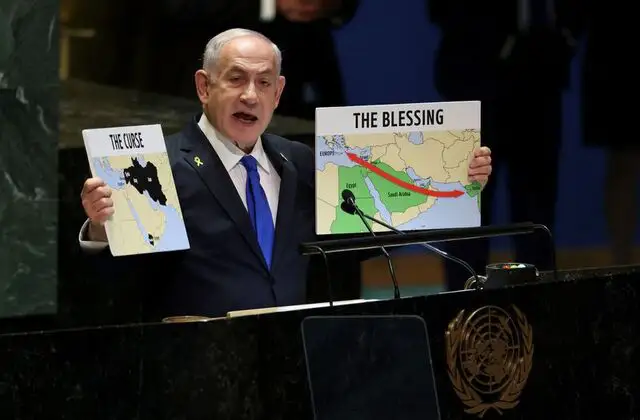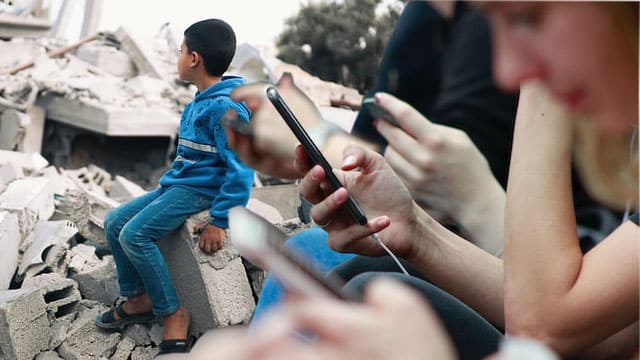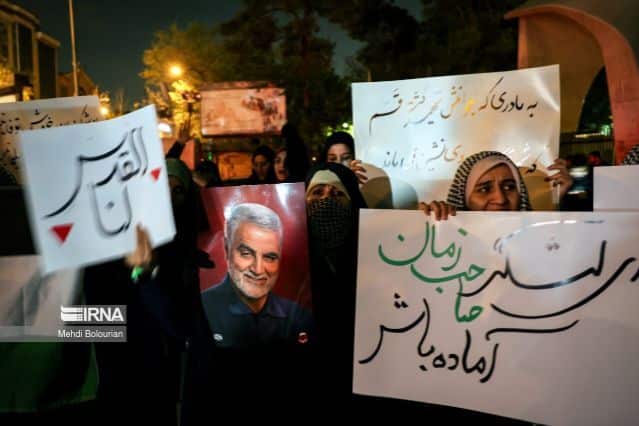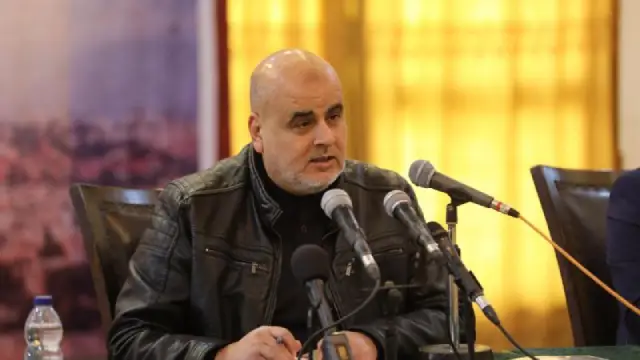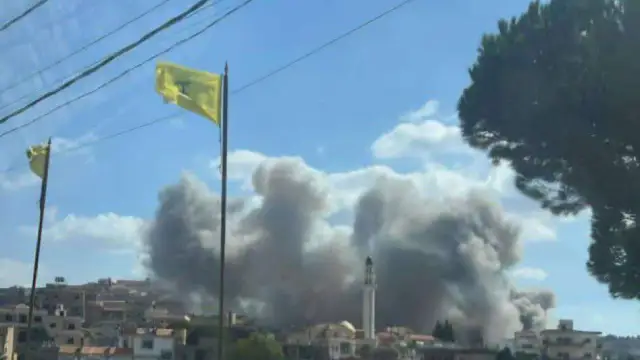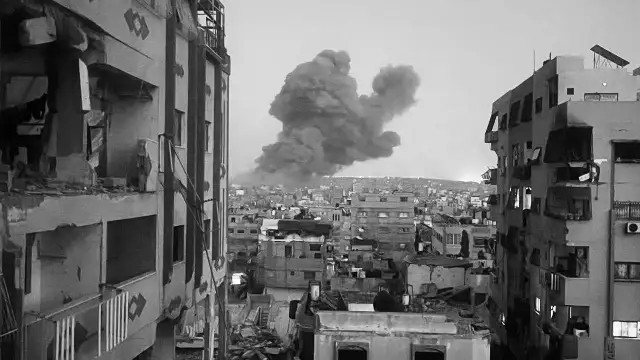In a dramatic development that epitomises the human cost of Israel’s renewed offensive in Gaza, Hamas announced on Tuesday that it has lost contact with the group guarding American-Israeli prisoner Edan Alexander after an Israeli bombardment directly targeted their location. The 23-year-old Israel Defense Force (IDF) soldier is believed to be the last living American captive in Gaza, where he has been held since Hamas’s Operation Al-Aqsa Flood on October 7th 2023.
“We announce that we have lost contact with the team guarding soldier Edan Alexander following a direct ‘israeli’ bombardment targeting their location. We are still trying to reach them,” said Abu Obeida, the spokesman for the Martyr Izz El-Din Al-Qassam Brigades, Hamas’s military wing, in a statement issued in both English and Hebrew.
The spokesman accused the Israeli government of deliberately putting Edan Alexander’s life at risk: “It seems that the occupation army is deliberately trying to kill him and hence relieve themselves from the pressure caused by the dual-citizen prisoners in order to continue its genocide against our people.”
This development comes at a critical juncture in the 18-month conflict that has killed over 50,800 Palestinians in Gaza.
What does Edan Alexander’s situation reveal about the state of ceasefire negotiations?
And how are ongoing Israeli military operations affecting both Palestinian civilians and the remaining Israeli prisoners?
Israel’s renewed offensive puts Edan Alexander and other prisoners at risk
The precarious situation surrounding Edan Alexander underscores the perilous position of the remaining hostages in Gaza after Israel abandoned January’s ceasefire agreement and resumed its offensive on March 18th 2025.
The Tikva Forum, a group representing some family members of hostages held in Gaza, had stated on Tuesday that Edan Alexander was among up to ten hostages who could be released by Hamas if a new ceasefire were reached.
The group cited a conversation between Prime Minister Benjamin Netanyahu and the mother of another hostage. Mr Netanyahu’s office has not commented on this claim.
Edan Alexander’s case has drawn particular attention from the American government.
President Donald Trump‘s special envoy Steve Witkoff told reporters at the White House in March that gaining the release of Edan Alexander, believed to be the last living American hostage held by Hamas in Gaza, was a “top priority for us”.
The Martyr Izz El-Din Al-Qassam Brigades had previously released two videos of the American-Israeli soldier.
In these recordings, Edan Alexander expressed his frustration with the Netanyahu government and the US for abandoning him in Gaza.
He stated that he feared he would never return home alive as Israeli bombardments grew closer to his location.
Visit our Telegram channel to watch the full, uncensored video of Edan Alexander.
Hamas has consistently accused Israel of attempting to kill the remaining hostages to eliminate any prospect for ceasefire negotiations.
Tuesday’s announcement about losing contact with Edan Alexander’s guards appears to support this narrative, though Israel has not responded to the specific allegation.
A grim toll continues to rise
While Edan Alexander’s fate hangs in the balance, Israeli military operations across Gaza continue to inflict heavy casualties.
Between the evening of April 14th and April 15th, at least 32 Palestinians were killed in various attacks across the territory.
A particularly deadly incident occurred in Khirbet Al-Adas, north of Rafah, where nine members of the Qishta and Shalouf families were killed.
In Deir al-Balah, Israeli forces targeted the vicinity of Al-Aqsa Martyrs Hospital, killing two Palestinians and wounding six.
Khan Younis faced several attacks, including a strike at Kuwait Hospital that resulted in the death of a medical worker.
Three people were killed when a tent in Mawasi was bombed.
In northern Gaza, two brothers were killed by a drone strike in Beit Hanoun, and two others died when a tent was bombed in Beit Lahia.
Eastern Gaza City—specifically the neighbourhoods of Shuja’iyya, Tuffah, Zaytoun, and Sha’af—continues to face heavy shelling, helicopter and drone gunfire, airstrikes and demolitions.
Central Gaza (Nusseirat, Bureij, Maghazi) has also been subjected to shelling and strikes, while Rafah experienced further demolitions and shelling.
In one particularly disturbing incident, a young girl was killed after being shot by a drone near Maamadani hospital.
Additionally, three bodies were recovered seven months after their deaths in Beit Lahia, highlighting the long-term impact of the conflict and the difficulty in accounting for all casualties.
Humanitarian crisis deepens amid Israeli blockade
Beyond the immediate violence, Hamas has accused Israel of deliberately creating catastrophic living conditions in Gaza.
In a statement issued on Tuesday, the group condemned what it called a systematic policy of starvation:
“For the seventh consecutive week, the fascist occupation government continues to block the entry of all essential life-sustaining supplies—including food, medicine, and fuel—into the Gaza Strip. In addition, it has targeted water wells and desalination plants, disrupted relief efforts, and obstructed food distribution centres.”
Hamas characterised these actions as “a deliberate and planned crime of genocide” being carried out “amid disturbing international silence.”
The group called on the United Nations and the international community to “fulfil their legal and humanitarian responsibilities by taking immediate and serious steps to compel the occupation to halt its collective starvation policy.”
The issue of aid has been central to ceasefire negotiations.
The Popular Resistance Committees, another Palestinian faction, stated that they are “open to any proposal that ends the criminal war and genocide waged by the entity against our people—including the withdrawal of the Zionist enemy from the Gaza Strip, reconstruction, the entry of aid, and relief for our people without any conditions.”
However, the group claimed that Israel’s insistence on including the disarmament of Palestinian resistance groups in any ceasefire proposal is intended to “obstruct and sabotage negotiations.”
They argue this proves that Israel “has no desire to reach any agreement that would lead to the return of its captives or an end to the war.”
International pressure mounts as Gaza “cries out”
Hamas has called for a global week of solidarity titled “Gaza Cries Out to You” to pressure Israel and its international backers.
The group is urging “the mobilisation of all energies and means throughout the upcoming week in support of Gaza’s steadfastness, in condemnation of the aggression, and to demand an end to the genocide.”
The solidarity campaign designates April 18th-20th as “days of global rage against the occupation, in rejection of US support and international complicity.”
Additionally, Hamas is supporting calls for a “Global Student and Labour Strike Day” on April 22nd in universities, educational institutions, and labour unions worldwide.
Earlier, the Palestinian resistance organisations had jointly called for a global strike on April 7th against Israel’s ongoing attacks on Gaza.
Meanwhile, the left-wing Popular Front for the Liberation of Palestine (PFLP) has condemned the United States for its continued military support of Israel.
The group highlighted “the US administration’s approval of a new multi-billion-dollar military deal for the Zionist occupation, which includes advanced equipment and munitions for the air force,” characterising it as “a continuation of direct American support for the genocidal war against our people.”
“Through these policies, America entrenches its role as a primary partner in the aggression and will forever bear the shame and curse of its criminal record against peoples, especially the Palestinian people,” the PFLP asserted.
“We call on the free people of America to escalate political and popular confrontation with the US administration and the zionist lobby, and to continue pressuring for an end to the genocidal war against the Palestinian and Yemeni peoples,” the PFLP’s statement further added.
For Edan Alexander and the remaining hostages, the path to freedom appears increasingly uncertain as Israel presses ahead with its military campaign.
As casualties mount and humanitarian conditions deteriorate, the prospects for a new ceasefire that could save their lives—and those of countless Palestinians—seem increasingly remote.
The siege of Gaza has now entered its 19th month, with no end in sight. As Edan Alexander’s fate remains unknown, his case has become emblematic of the human cost of this protracted conflict—for both Israelis and Palestinians alike.


